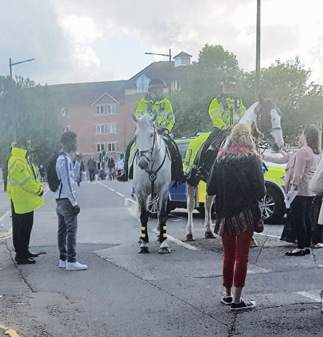A round 7pm on a Saturday in June, Cardiff city centre was one busy place. The crowd was streaming from Sophia Gardens after England beat Bangladesh in the Cricket World Cup.
Some of the thousands, on their way to the main train station and not heading for a celebratory pint, passed the Millennium Stadium, where the queues were for Take That in concert. I paused at the pair of police horses to take in the policing and stewarding scene (page 14). Beside the horses, which always draw people, was a policeman with machine-gun. Across the road, stewards behind a temporary barrier. On the other side, the search line outside the Millennium, some way outside, that had hundreds backing up towards the city centre. Temporary fencing funnelled the cricket spectators towards the station. As at so many sporting and other venues, you had the grotesque sight of a ‘crowded place’, to use the counter-terrorism jargon, an ideal target for a suicide bomber or knifer, precisely as a result of security checks. At such a place, probably, the next terrorists will strike. Yet how to reduce this risk? Give people a set time to arrive for the bag and wand check (as at Sophia Gardens)? How do you uncrowd a crowd? At Cardiff, stewards did a ‘wand’ search of bodies, after the bag search. The previous Saturday at another World Cup match, Australia (boo!) versus Afghanistan, spectators only had bags searched (see page 54) at entry, no wanding. Was the risk really that different at the two events?
Last month when I saw Prof Mark Button I thanked him for a copy of the new edition of his book Private Policing. Inside (although I am far from finishing it) he writes of a ‘second revolution’. The first, over recent decades, saw private companies doing police or state-style work, such as guarding prisons and immigration detention centres. The new era of private policing that Mark spotted is in the cyber world, where the state is not keeping up, despite the obvious wrongs online. Private security providers keep coming up with new bodies; such as the City Security Council (page 21) in London. By contrast, the public authorities do a poor job marketing what they set up years ago, such as Employer Supported Policing (page 36). The Security Institute, too, is setting up ‘special interest groups’; I enjoyed a morning at the offices of International SOS for a crisis simulation workshop (from page 28). Which reminds me that SheTravel, featured in May, is having a launch in Fitzrovia on Wednesday evening, July 3. The Institute has its gala dinner the same night, just over a mile away, at London Zoo. Ah, the social whirl!?
I must make a correction to something on page 16 of last month’s issue; I got ahead of myself, or was guilty of wishful thinking, by stating that the Irish regulator the PSA badges installers of safes, and consultants; when in fact it doesn’t; or will ‘in due course’. At the risk of more error, note that the Irish Republic badges contract locksmiths (since 2017) and private investigators. Theresa May never did get round to licensing UK PIs.









